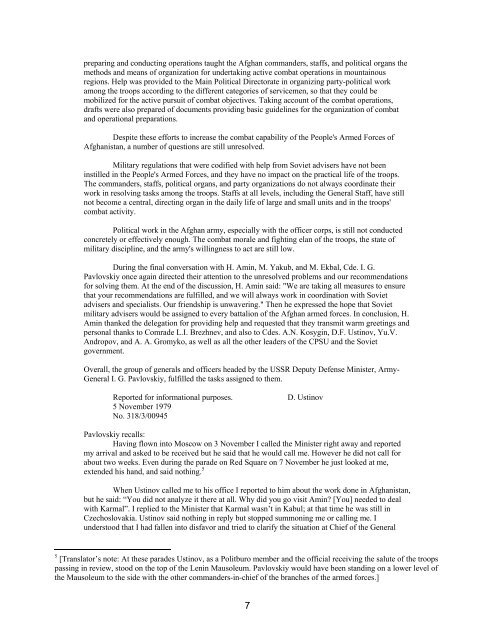Aleksandr Antonovich Lyakhovskiy Working Paper pp - Woodrow ...
Aleksandr Antonovich Lyakhovskiy Working Paper pp - Woodrow ...
Aleksandr Antonovich Lyakhovskiy Working Paper pp - Woodrow ...
You also want an ePaper? Increase the reach of your titles
YUMPU automatically turns print PDFs into web optimized ePapers that Google loves.
preparing and conducting operations taught the Afghan commanders, staffs, and political organs the<br />
methods and means of organization for undertaking active combat operations in mountainous<br />
regions. Help was provided to the Main Political Directorate in organizing party-political work<br />
among the troops according to the different categories of servicemen, so that they could be<br />
mobilized for the active pursuit of combat objectives. Taking account of the combat operations,<br />
drafts were also prepared of documents providing basic guidelines for the organization of combat<br />
and operational preparations.<br />
Despite these efforts to increase the combat capability of the People's Armed Forces of<br />
Afghanistan, a number of questions are still unresolved.<br />
Military regulations that were codified with help from Soviet advisers have not been<br />
instilled in the People's Armed Forces, and they have no impact on the practical life of the troops.<br />
The commanders, staffs, political organs, and party organizations do not always coordinate their<br />
work in resolving tasks among the troops. Staffs at all levels, including the General Staff, have still<br />
not become a central, directing organ in the daily life of large and small units and in the troops'<br />
combat activity.<br />
Political work in the Afghan army, especially with the officer corps, is still not conducted<br />
concretely or effectively enough. The combat morale and fighting elan of the troops, the state of<br />
military discipline, and the army's willingness to act are still low.<br />
During the final conversation with H. Amin, M. Yakub, and M. Ekbal, Cde. I. G.<br />
Pavlovskiy once again directed their attention to the unresolved problems and our recommendations<br />
for solving them. At the end of the discussion, H. Amin said: "We are taking all measures to ensure<br />
that your recommendations are fulfilled, and we will always work in coordination with Soviet<br />
advisers and specialists. Our friendship is unwavering." Then he expressed the hope that Soviet<br />
military advisers would be assigned to every battalion of the Afghan armed forces. In conclusion, H.<br />
Amin thanked the delegation for providing help and requested that they transmit warm greetings and<br />
personal thanks to Comrade L.I. Brezhnev, and also to Cdes. A.N. Kosygin, D.F. Ustinov, Yu.V.<br />
Andropov, and A. A. Gromyko, as well as all the other leaders of the CPSU and the Soviet<br />
government.<br />
Overall, the group of generals and officers headed by the USSR Deputy Defense Minister, Army-<br />
General I. G. Pavlovskiy, fulfilled the tasks assigned to them.<br />
Reported for informational purposes.<br />
5 November 1979<br />
No. 318/3/00945<br />
D. Ustinov<br />
Pavlovskiy recalls:<br />
Having flown into Moscow on 3 November I called the Minister right away and reported<br />
my arrival and asked to be received but he said that he would call me. However he did not call for<br />
about two weeks. Even during the parade on Red Square on 7 November he just looked at me,<br />
extended his hand, and said nothing. 5<br />
When Ustinov called me to his office I reported to him about the work done in Afghanistan,<br />
but he said: “You did not analyze it there at all. Why did you go visit Amin [You] needed to deal<br />
with Karmal”. I replied to the Minister that Karmal wasn’t in Kabul; at that time he was still in<br />
Czechoslovakia. Ustinov said nothing in reply but sto<strong>pp</strong>ed summoning me or calling me. I<br />
understood that I had fallen into disfavor and tried to clarify the situation at Chief of the General<br />
5 [Translator’s note: At these parades Ustinov, as a Politburo member and the official receiving the salute of the troops<br />
passing in review, stood on the top of the Lenin Mausoleum. Pavlovskiy would have been standing on a lower level of<br />
the Mausoleum to the side with the other commanders-in-chief of the branches of the armed forces.]<br />
7

















